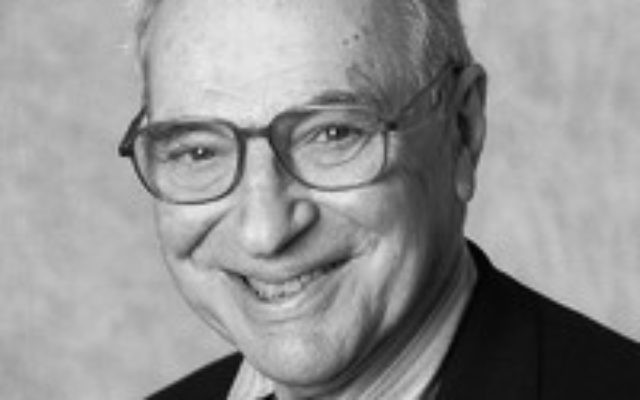Jewish Nobel winner Kenneth Arrow dies at 95
Born to Romanian immigrant parents in New York, the pioneering economist was the youngest to win the prize in his field
Kenneth Arrow, the youngest-ever winner of a Nobel prize for economics whose theories on risk, innovation and the basic mathematics of markets influenced thinking on everything from voting to health insurance and high finance, has died.
Mr Arrow, 95, died on Tuesday at his home in Palo Alto, California.
Born in New York City to Jewish immigrants from Romania, his son David said: “He was a very loving, caring father and a very, very humble man.
“He’d do the dishes every night and cared about people very much.
“I think in his academic career, when people talk about it, it often sounds like numbers and probabilities. But a large focus of his work was how people matter.
“The fact that people often don’t behave rationally … that was one aspect that he often looked at, how it affected the lives of the people.”
Mr Arrow and British economist Sir John Hicks shared the 1972 Nobel memorial prize in economic science for their pioneering mathematical work on general equilibrium theory, which says there is an overall balance between supply and demand in an economy as a whole.
Their mathematical models dealt with the factors involved, such as when and where a product is sold.
Mr Arrow spent most of his career at Stanford University but also taught for 11 years at Harvard.
He was also known as a mentor and five of his former students went on to become Nobel winners.
Mr Arrow came to prominence in 1951 with a book, Social Choice And Individual Values, which used mathematical logic to discuss collective decision-making.
He put forward a theorem that it was impossible for a majority-rule voting system with three candidates to be free of certain flaws.
“You can say, ‘There’s no really good way to run an election’, but it is something else to prove it, fellow economics laureate Robert Aumann, told the Washington Post.
“It’s like proving a bicycle cannot be stable.”
Mr Arrow’s impossibility theorem “fundamentally altered economic and political theory and practice” Mr Aumann said.
Mr Arrow had a broad intellectual curiosity that covered subjects as diverse as music, Chinese art and even whales.
“He was interested in everything,” his son said.
In economics, he looked at how risk aversion, innovation and information affected the economy.
In a 1963 paper he confronted problems with the economics of medical care and health insurance, arguing that it is not a truly price-competitive situation because among other things the buyer – the patient – has much less information than the doctor – the seller – about necessary treatment and options.
The issue is known in economics as “asymmetric information”.
If Mr Arrow’s work seemed dry and abstract, it had real-world applications in many fields.
“The economics of insurance, medical care, prescription drug testing – to say nothing of bingo and the stock market – will never be the same after Arrow,” Paul Samuelson, the first American to win the economics prize, said in 1972 after Mr Arrow won the prize.
Mr Arrow was also awarded the 2004 National Medal of Science, America’s highest scientific honour, by then president George Bush.
Several other members of the family became economics professors and his nephew, Lawrence Summers, is a former Harvard University economics professor, Harvard president, US Treasury secretary under Bill Clinton and adviser to Barack Obama.
In addition to his son, Mr Arrow is survived by another son Andrew, a sister, Anita Summers, and a grandson.

Thank you for helping to make Jewish News the leading source of news and opinion for the UK Jewish community. Today we're asking for your invaluable help to continue putting our community first in everything we do.
For as little as £5 a month you can help sustain the vital work we do in celebrating and standing up for Jewish life in Britain.
Jewish News holds our community together and keeps us connected. Like a synagogue, it’s where people turn to feel part of something bigger. It also proudly shows the rest of Britain the vibrancy and rich culture of modern Jewish life.
You can make a quick and easy one-off or monthly contribution of £5, £10, £20 or any other sum you’re comfortable with.
100% of your donation will help us continue celebrating our community, in all its dynamic diversity...
Engaging
Being a community platform means so much more than producing a newspaper and website. One of our proudest roles is media partnering with our invaluable charities to amplify the outstanding work they do to help us all.
Celebrating
There’s no shortage of oys in the world but Jewish News takes every opportunity to celebrate the joys too, through projects like Night of Heroes, 40 Under 40 and other compelling countdowns that make the community kvell with pride.
Pioneering
In the first collaboration between media outlets from different faiths, Jewish News worked with British Muslim TV and Church Times to produce a list of young activists leading the way on interfaith understanding.
Campaigning
Royal Mail issued a stamp honouring Holocaust hero Sir Nicholas Winton after a Jewish News campaign attracted more than 100,000 backers. Jewish Newsalso produces special editions of the paper highlighting pressing issues including mental health and Holocaust remembrance.
Easy access
In an age when news is readily accessible, Jewish News provides high-quality content free online and offline, removing any financial barriers to connecting people.
Voice of our community to wider society
The Jewish News team regularly appears on TV, radio and on the pages of the national press to comment on stories about the Jewish community. Easy access to the paper on the streets of London also means Jewish News provides an invaluable window into the community for the country at large.
We hope you agree all this is worth preserving.






















